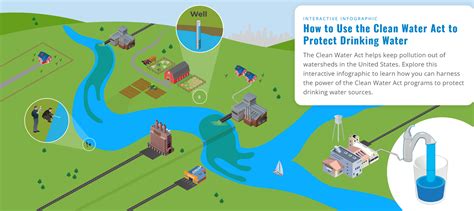Introduction

Water is essential for life. We use it to drink, bathe, irrigate our crops, and generate electricity. Unfortunately, our water resources are increasingly under threat from pollution. The Clean Water Act (CWA) is the primary federal law in the United States that protects our water quality.
The Clean Water Act
The CWA was passed in 1972 to restore and maintain the chemical, physical, and biological integrity of the nation’s waters. The law sets water quality standards for all surface waters in the United States, and it regulates the discharge of pollutants into these waters.
The CWA has been very effective in improving water quality in the United States. Since the law was passed, the number of water bodies that are fishable and swimmable has increased significantly. The law has also helped to reduce pollution from industrial and agricultural sources.
The Importance of Water Quality
Clean water is essential for human health and the environment. Drinking contaminated water can lead to a variety of health problems, including gastrointestinal illness, skin infections, and cancer. Water pollution can also harm fish and wildlife, and it can damage ecosystems.
Threats to Water Quality
There are a number of threats to water quality, including:
- Industrial pollution: Industrial activities can release a variety of pollutants into the environment, including chemicals, metals, and solvents. These pollutants can contaminate surface water and groundwater.
- Agricultural pollution: Agricultural activities can also release pollutants into the environment, including pesticides, fertilizers, and animal waste. These pollutants can contaminate surface water and groundwater.
- Municipal wastewater: Municipal wastewater can contain a variety of pollutants, including bacteria, viruses, and chemicals. This wastewater can be discharged into surface water or groundwater.
- Stormwater runoff: Stormwater runoff can carry pollutants from streets, parking lots, and other impervious surfaces into surface water. These pollutants can include sediment, nutrients, and bacteria.
Protecting Water Quality
There are a number of things that we can do to protect water quality, including:
- Reducing industrial pollution: We can reduce industrial pollution by requiring industries to install pollution control equipment and by promoting cleaner production methods.
- Reducing agricultural pollution: We can reduce agricultural pollution by promoting the use of conservation tillage, cover crops, and other best management practices.
- Reducing municipal wastewater pollution: We can reduce municipal wastewater pollution by upgrading wastewater treatment plants and by promoting water conservation.
- Reducing stormwater runoff pollution: We can reduce stormwater runoff pollution by installing green infrastructure, such as rain gardens and bioswales.
The Importance of the Clean Water Act
The Clean Water Act is an essential law that protects our water quality. The law has been very effective in reducing pollution and improving water quality in the United States. We must continue to support the Clean Water Act and work to protect our water resources.
Activity
- Read the article about the Clean Water Act.
- Answer the following questions:
- What is the Clean Water Act?
- Why is the Clean Water Act important?
- What are some threats to water quality?
- What can we do to protect water quality?
- Discuss the importance of the Clean Water Act with your classmates.
Additional Resources
